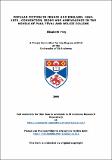Popular fiction in France and England, 1860-1875 : convention, irony and ambivalence in the novels of Paul Féval and Wilkie Collins
Abstract
This thesis is a comparative study of two popular nineteenth-century writers, Paul Feval and Wilkie Collins, and by extension, of their respective traditions, the Roman-Feuilleton and the Sensation novel. At the same time, the thesis seeks to provide new insight into the nature and function of
popular fiction as a genre.
This study argues that, contrary to common assumptions, popular fiction is a complex and dialogic form. As a comparative project, this thesis underscores similarities and differences between the two writers.
Chapter I looks at the narrative structures of the novels. It demonstrates that the use of archetypal story-patterns and characters leaves room for 'both thoughtful and ironically playful narrative experiments, resulting in a surprising degree of self-reflexivity.
Chapter Il emphasises the dialogic nature of the texts by examining the ways they evoke and rework different genres and registers. It argues that the mingling of tones and moods serves both to stimulate readers' pleasure and to convey criticism of contemporary society. Making use of Mikhaïl
Bakhtin's theories on popular culture, this section highlights the carnivalesque nature of the texts.
Chapter III addresses in detail the formal influence of the theatre on the two sets of texts and investigates the use of theatrical metaphors in the novels as a way to explore the workings of society.
Chapter IV sets out to redress common assumptions about the conservatism of Féval's narratives and the radical nature of Collins' novels by highlighting the existence of two contrary discourses, one manichean and conservative, the other rebellious and immoral.
Chapter V makes use of René Girard's theory of the scapegoat. By showing how the two discourses articulate around a scapegoat figure, it draws a parallel between the mechanisms of popular fiction and social mechanisms. Finally, this section argues that both Féval and Collins were aware of the ideological charge of the form they were using and of its limitations.
Type
Thesis, PhD Doctor of Philosophy
Collections
Items in the St Andrews Research Repository are protected by copyright, with all rights reserved, unless otherwise indicated.

